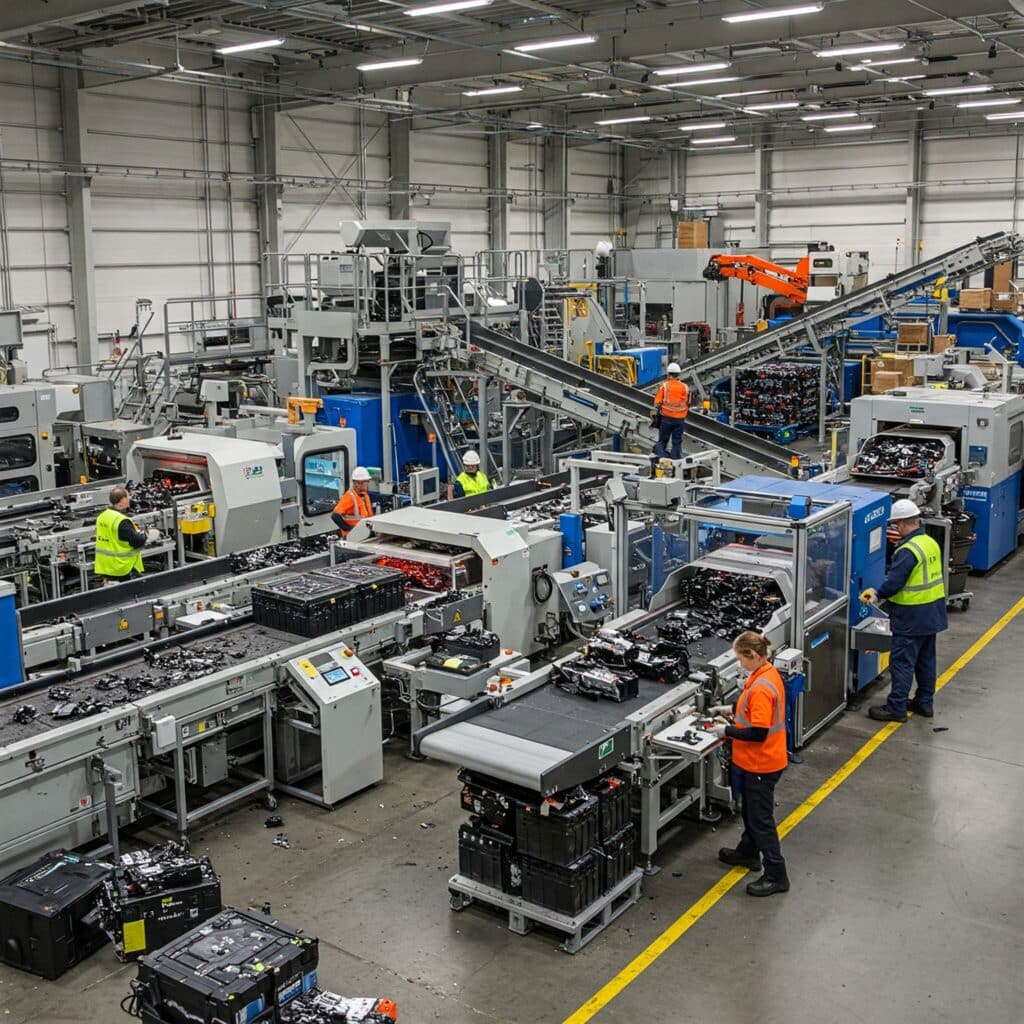LG Energy Solution and Toyota Tsusho Establish a Battery Recycling Joint Venture in NC
LG Energy Solution and Toyota Tsusho Corporation announced on June 19, 2025 the establishment of Green Metals Battery Innovations, LLC, a joint venture dedicated to transforming the EV battery lifecycle. Under an agreement between LG Energy Solution Michigan and Toyota Tsusho America, the companies plan to establish a pre-processing recycling plant in Winston-Salem, North Carolina, to extract black mass — a material containing high-value metals such as nickel, cobalt, and lithium — from battery production scrap.
The facility is scheduled to begin operations in 2026 with a target capacity of 13,500 tons of scrap annually, equivalent to approximately 40,000 automotive batteries. LG Energy Solution will supply the scrap, generated during its EV battery production for Toyota Motor. The recovered black mass will then be sent for further processing to reclaim raw materials for reuse in new battery production, creating a closed-loop system that supports a truly circular economy across the supply chain.

This partnership underscores both companies’ commitment to sustainability, as they work to reduce carbon emissions and environmental impact by extending the lifecycle of battery materials. LG Energy Solution, the world’s largest lithium-ion battery manufacturer, brings three decades of expertise and more than 69,600 patents to the venture. Its global manufacturing footprint and innovation pipeline make it a pioneer in green battery solutions.
Toyota Tsusho Corporation, part of the Toyota Group, contributes its extensive experience in automotive logistics, trading, and supply chains. Together, they aim to establish a competitive regional recycling infrastructure that supports Toyota’s sustainability goals and the broader EV ecosystem for years to come.
With this joint venture, LG Energy Solution and Toyota Tsusho demonstrate a bold commitment to circularity — ensuring that EV battery materials remain in use as long as possible and that future mobility will be powered by more sustainable and responsible processes. To learn more, visit LG Energy Solution’s newsroom at https://news.lgensol.com.
Battery Recycling: Another Reason BEVs Are the Most Eco-Friendly Transportation
When we talk about sustainability in transportation, battery electric vehicles (BEVs) often take center stage—and for good reason. They produce zero tailpipe emissions, help reduce local air pollution, and contribute to lowering greenhouse gas emissions. But one often-overlooked advantage of BEVs lies in the way their most valuable components, especially critical minerals like lithium, cobalt, and nickel, can be recycled and reused to minimize environmental impact.
Traditional gas-powered cars burn finite fossil fuels, generating emissions that cause climate change, and leave nothing reusable behind. BEV batteries, on the other hand, offer a circular path. Even after they can no longer power a car, their materials retain tremendous value. Innovative recycling processes extract these metals to produce new batteries, greatly reducing the need for mining raw materials. Every ton of minerals recycled means less pressure on ecosystems and a lower carbon footprint per mile driven.
Companies around the world, including major automakers and battery manufacturers, are investing in closed-loop recycling and pre-processing technologies. Partnerships like those between LG Energy Solution and Toyota Tsusho aim to reclaim raw materials efficiently and sustainably. Over time, this will make BEV production more resource-efficient, improve material security, and decrease the energy intensity of battery manufacturing.
This focus on recycling further enhances the already strong sustainability profile of BEVs. Unlike internal combustion engine cars—which can never reuse burned fuel—BEVs leverage their own components for future generations of clean transportation. That’s why BEVs are the most eco-friendly way to get around today. Their impact will only grow as more recycled materials enter the supply chain, creating a virtuous cycle that supports a truly sustainable future for mobility.

Electric Vehicle Marketing Consultant, Writer and Editor. Publisher EVinfo.net.
Services